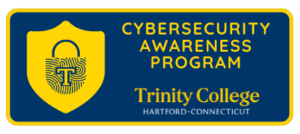Cybersecurity Education & Awareness
Cybersecurity Training and Awareness
At Trinity College, information security is a shared responsibility. Everyone who uses college computers and networks or handles information protects our data and services. Being aware of potential risks and knowing how to defend against them helps protect yourself and the college.
Trinity’s Cybersecurity Training Platform is available for all faculty and staff to complete their annual training at their convenience. This training will enhance your understanding of cybersecurity threats and provide best practices to protect against them. You may have already received an email reminder about completing this essential training.
What is KnowBe4?
KnowBe4 is a trusted cybersecurity training platform used by over 35,000 organizations worldwide. It provides engaging, short training modules and simulated phishing exercises to raise awareness of cybersecurity risks and help users recognize threats. Many institutions, including Trinity’s closest partners, rely on KnowBe4 to enhance their security awareness.
How Does KnowBe4 Work?
KnowBe4 provides brief, interactive training sessions designed to engage and educate. The platform also allows us to run phishing simulations that mimic real cyber threats, such as suspicious emails with poor grammar, unknown senders, or urgent requests.
If you receive a suspicious email, click the Phish Alert Button to report it. Whether the email is a simulation or a real threat, your report helps us improve our training and protect the college’s systems.
What Happens with the Results?
The information we gather from reported phishing attempts helps us identify and eliminate real threats. We will also use this data to refine our training and strengthen our security strategy. All reported data is aggregated and anonymized to protect your privacy.
Next Steps After Training
After completing the training, remember to stay vigilant. If you receive a suspicious email, use the Phish Alert Button to report it. Your participation is crucial in helping us secure Trinity College.
If you have any questions, suggestions, or concerns, please contact us at [email protected].
